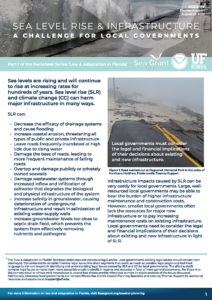 A series of newly published fact sheets for Extension Agents provides summaries of various aspects of legal work addressing climate change, sea level rise, and the legal and policy issues confronting local governments.
A series of newly published fact sheets for Extension Agents provides summaries of various aspects of legal work addressing climate change, sea level rise, and the legal and policy issues confronting local governments.
Sea levels are rising and will continue to rise at an alarming rate for hundreds of years. Sea level rise (SLR) and climate change can harm major infrastructure in many coastal areas. In Florida, 76.5% of the state’s population lives in coastal areas. As the population and development alongside the coasts increase, the necessity to inform local governments of these issues and existing policies is crucial in guiding effective legal decisions.
In response, Florida Sea Grant Law and Policy Specialist, Thomas Ruppert, Esq., created the “Law and Adaptation” series based on past legal publications, presentations, and experiences with local governments. The four publications focus on the legal and financial implications of existing and new infrastructure and drainage amid sea level rise and climate change:
- Sea Level Rise and Infrastructure
- Sea Level Rise and Drainage
- Florida Statutory Private Property Rights Protections and Sea Level Rise
- Buyouts Under the National Flood Insurance Plan
The guide also provides agents with information on the recent changes to private property protection under the Bert Harris Act and its potential impacts on growing fields of resilience and sea level rise adaptation, as well as information on the challenges and viability of buyouts – the governmental purchase of an at-risk property.
“While Extension Agents are not lawyers, providing them with condensed and simplified summaries of the legal issues allows them to present such issues in appropriate times and ways within their local government context,” says Ruppert.
To access the guides and other publications and resources by Thomas Ruppert, visit www.flseagrant.org/climate-change-coastal-hazards/.